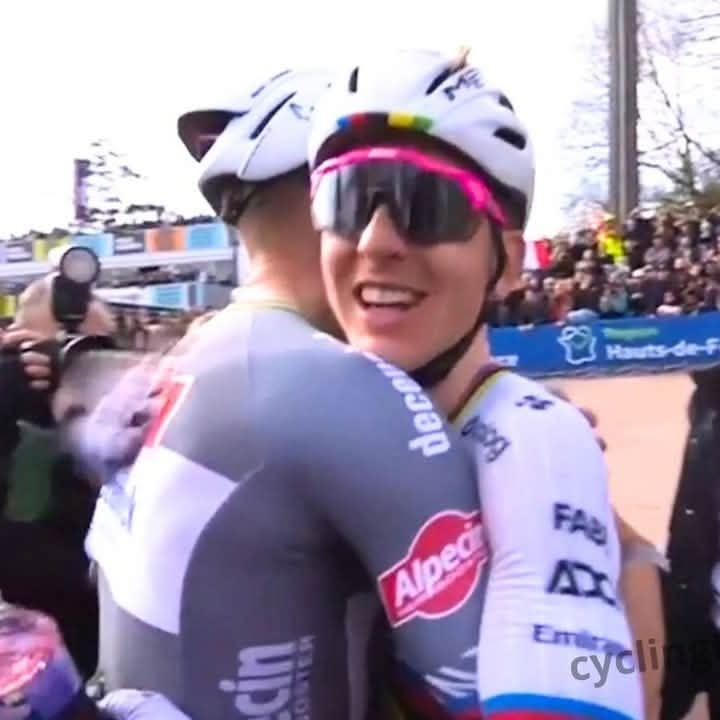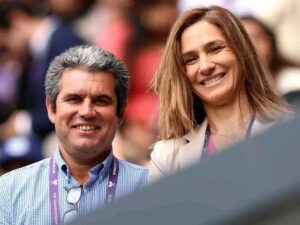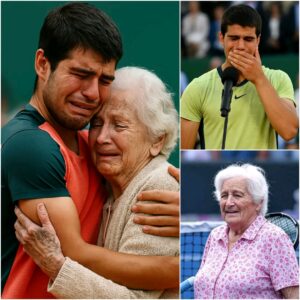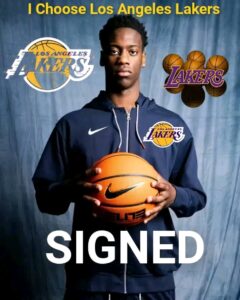
In the world of professional cycling, where grit, endurance, and strategy intertwine, gestures often speak louder than words. At the finish line of the legendary Paris-Roubaix, a race notorious for its punishing cobblestone sectors and brutal demands, one moment stood out beyond the roar of the crowd or the flash of finish-line cameras—a heartfelt hug between Tadej Pogačar and Mathieu Van der Poel. It was a simple gesture, but it encapsulated something profound: mutual respect, admiration, and the raw human emotion behind elite competition.
Paris-Roubaix is not just any race. Dubbed “The Hell of the North,” it is one of the oldest and most grueling one-day races in the cycling calendar. Riders emerge coated in dust, sweat, and sometimes blood, having endured hours of pounding over stones and pushing past pain. To reach the finish at the Roubaix Velodrome is, in itself, a badge of honor. To be among the frontrunners, a mark of greatness.
Pogačar and Van der Poel are titans of modern cycling, each carving his own legacy with fearless racing and jaw-dropping performances. Van der Poel, a rider seemingly born for the chaos of the cobbles, has etched his name into the Paris-Roubaix history books. Pogačar, with his Grand Tour pedigree, continues to surprise the cycling world by excelling across all terrains, from the high Alps to the flat, ferocious classics.
This year, their rivalry was not one of animosity but of mutual elevation. They pushed each other to the limit, taking turns attacking, responding, and dictating the pace. In a race where one mistake can end your chances, their duel was a display of supreme bike handling, strategy, and mental toughness. But it was also something more—it was sport at its most honorable.
As they crossed the finish line, there was no theatrical celebration or boastful display. Instead, the two champions looked at each other, both visibly drained yet smiling, and embraced. That hug was everything. It spoke of shared suffering, of recognition, of admiration that transcends the finish line and podium. It was a reminder that behind the helmets and sunglasses are athletes who understand the depth of effort each one gives to be at the top.
In a sport often marred by rivalry, controversy, and fierce egos, moments like this bring us back to the core of competition: respect. Fans watching around the world, whether from the velodrome seats or living room couches, felt that authenticity. It wasn’t scripted or expected—it was a spontaneous, genuine show of sportsmanship that resonated deeply.
Cycling needs these moments. In a landscape dominated by statistics, tactics, and results, the human stories are what endure. Pogačar and Van der Poel’s hug will not be remembered for changing the standings, but for reminding us why we love this sport: the drama, the beauty, and the mutual recognition between warriors who give everything for the ride.
As we look ahead to future races, rivalries will continue, as they should. But this moment in Roubaix serves as a powerful reminder that respect doesn’t lessen competition—it enhances it. In fact, it raises the stakes, because it means that every attack, every counter, every pedal stroke is a tribute to the other’s strength.
In the end, while thousands of words could be written about tactics, timing, and tire choices, none of them will capture the essence of that moment as purely as that single, unspoken gesture. A hug between two champions, at the end of hell, at the height of respect. A gesture truly worth more than a thousand words.







